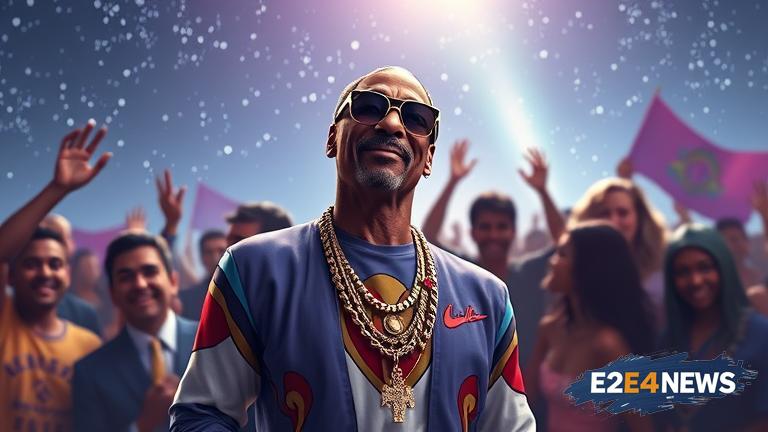Snoop Dogg, the renowned American rapper, has found himself at the center of a controversy surrounding the Disney-Pixar film Lightyear. The movie, which is a spin-off of the popular Toy Story franchise, features a same-sex kiss between two female characters, Alisha Hawthorne and her wife. Snoop Dogg, who was watching the film with his grandson, expressed his discomfort with the scene, stating that he was not prepared for the LGBTQ+ themes. The rapper’s comments sparked a heated debate online, with many fans and supporters of the LGBTQ+ community criticizing his reaction. Some argued that Snoop Dogg’s response was homophobic and that he should be more accepting of diverse relationships. Others defended the rapper, stating that he was simply expressing his personal opinion and that parents should have the right to decide what content is suitable for their children. The controversy surrounding Lightyear is not new, as the film has faced backlash from some conservative groups and countries, including the United Arab Emirates, Saudi Arabia, and Egypt, which have banned the movie due to its LGBTQ+ content. Despite the controversy, Lightyear has received widespread critical acclaim, with many praising the film’s animation, storytelling, and representation of diverse characters. The movie’s director, Angus MacLane, has stated that the film’s LGBTQ+ themes were always intended to be a part of the story and that he is proud to have included them. The controversy surrounding Snoop Dogg’s comments has highlighted the ongoing debate surrounding LGBTQ+ representation in media and the importance of diversity and inclusion in storytelling. Many have argued that the inclusion of LGBTQ+ characters and themes in films like Lightyear is essential for promoting acceptance and understanding of diverse relationships. Others have argued that parents should have the right to decide what content is suitable for their children and that films with LGBTQ+ themes should be labeled as such. The debate surrounding Lightyear has also sparked a wider conversation about the role of media in shaping cultural attitudes towards LGBTQ+ individuals. Some have argued that media has the power to promote acceptance and understanding of diverse relationships, while others have argued that it can also perpetuate harmful stereotypes and stigma. As the controversy surrounding Snoop Dogg’s comments continues to unfold, it is clear that the debate surrounding LGBTQ+ representation in media is far from over. The incident has also highlighted the importance of education and awareness about LGBTQ+ issues, particularly among parents and caregivers. Many have argued that parents should be having open and honest conversations with their children about diverse relationships and that media can play an important role in promoting acceptance and understanding. The controversy surrounding Lightyear has also sparked a wider conversation about the importance of diversity and inclusion in storytelling. Many have argued that films like Lightyear, which feature diverse characters and themes, are essential for promoting acceptance and understanding of diverse relationships. Others have argued that the inclusion of LGBTQ+ characters and themes in films is a step towards creating a more inclusive and accepting society. As the debate surrounding Lightyear continues to unfold, it is clear that the importance of diversity and inclusion in storytelling will remain a topic of discussion for years to come. The incident has also highlighted the importance of respecting diverse opinions and perspectives, particularly when it comes to sensitive topics like LGBTQ+ issues. Many have argued that Snoop Dogg’s comments, while uncomfortable for some, are a reflection of his personal opinion and that he should be respected for his honesty. Others have argued that the rapper’s comments were homophobic and that he should be held accountable for his words. As the controversy surrounding Snoop Dogg’s comments continues to unfold, it is clear that the debate surrounding LGBTQ+ representation in media is complex and multifaceted. The incident has also sparked a wider conversation about the role of celebrities in promoting acceptance and understanding of diverse relationships. Many have argued that celebrities like Snoop Dogg have a responsibility to use their platform to promote acceptance and understanding of LGBTQ+ individuals. Others have argued that celebrities should be free to express their personal opinions, even if they are uncomfortable or controversial. As the debate surrounding Lightyear continues to unfold, it is clear that the importance of diversity and inclusion in storytelling will remain a topic of discussion for years to come.





